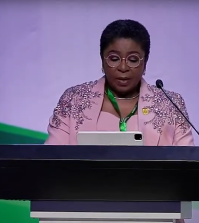Public servants have not been able to build defences for the next crisis, warns former Bank of England chief economist

Leading economist and public policy expert Andy Haldane has warned that public servants have not had enough “relative tranquillity” to recover from more than a decade of crisis.
In an exclusive interview for Global Government Forum’s Leading Questions podcast, Haldane – who was once named among the world’s 100 most influential people by Time magazine – shared his reflections on a public service career in which he walked “towards where the challenges are largest”.
Haldane talks with host Siobhan Benita about thriving on leading through crisis and the challenges and opportunities “when the old is broken and the new is yet to be forged”.
Having spent 32 years at the Bank of England, latterly as chief economist, he has seen his fair share of crises – not least the global financial crisis of 2008, the European debt crisis, Black Wednesday, and the COVID-19 pandemic.
Haldane has also headed up the UK government’s Levelling Up Taskforce, founded the charity Pro Bono Economics, and spent the last two years as chief executive of the Royal Society of Arts, giving him a range of roles and experiences to draw on.
Crises, he says, require people, teams and organisations to “suddenly switch from a marathon to a sprint – to go from neutral to fifth gear with nothing in between in terms of decision-making”.
Learning to do so is an asset, but Haldane also shares his concerns about the impact of successive crises on public servants. “You need time to recover your senses and sleep and regain energy but also over time, to be able to rebuild systems, to make them less vulnerable to those events in future and to be more resilient.
“My concern is that civil servants and central bankers haven’t a long enough window of relative tranquillity to build their sea defences against whatever the next tsunami might be. Without that time, you become a bit of a sitting duck for the next thing.”
Responding to crises is a “time of enormous challenge for everyone… but also a time of great opportunity,” Haldane adds. “There aren’t that many moments in public policy where you can really make a decisive shift in the way people think and the way things operate.”
‘Convince, coax and cajole’
In the podcast, Haldane says driving big system-wide change is the reason he went into public service and as such he finds himself energised during times of crisis.
In such situations, he says, you must avoid collateral damage and do what you can to stabilise the ship but also recognise that “it probably can’t be repaired by patching up the hole – what we might need is a new sort of vessel”.
Exercising leadership during the difficult times is “acutely strong, uniquely strong” yet “absolutely pointless if no-one is following”.
His advice? Firstly, to be clear in your own mind what needs to happen and then “convince, coax and cajole” others that “this is the path we need to follow to find our way out of the hole in which we’re stuck”.
Achieving buy-in for change in both conventional and non-conventional ways is one of the core pillars of Haldane’s approach. Convincing those in your own organisation is one thing, but in Haldane’s opinion, “the most effective and durable way of effecting change is by convincing as broad a base of stakeholders as possible”.
As such, throughout his career, he has taken great time and effort to maintain relationships not only with others within the public sector, but also those in the private sector and civil society.
This includes the public at large. One of the things of which he is most proud from his time in the Bank of England is working to engage communities and to understand the issues that mattered most to people.
It had struck him that politicians and policymakers were good at talking but “far less good at listening”. So, spurred by his modest upbringing in Yorkshire in the north of England in the 1980s and seeing the people for whom the economy was not working well, he sought out the voices which aren’t often heard.
These insights were “one of the most valuable sources of intelligence I could have had”, he says, adding that it is important leaders do not surround themselves only “with the usual suspects” but with those who have a different perspective to you. “Having your thinking challenged is a real positive.”
Engaging a range of stakeholders has been a boon to his policymaking career. “Many of the ideas I’ve come up with, which would be seen as being slightly left field, unconventional, heterodox, were really born of me having begged, borrowed and stolen thoughts from other people, other disciplines, and applying them in my sphere.”
A non-fatalistic mindset
In the podcast, Haldane also discusses the need for a sense of optimism in policy development, highlighting that areas where many see crises – technology, inequality, demography and climate change – are also huge opportunities.
“There’s much sucking of teeth and pursing of lips and wringing of hands when it comes to those four,” he says – talk of AI taking people’s jobs, of the economic impact of inequality, of aging populations being a drain on government resources and of the existential threat of climate change.
All those things may be true, he says, but it is also true that technology is a great enabler if appropriate safeguards are in place; that inequality shines a spotlight on those for whom opportunity is not currently being realised; that people living longer means they are healthier and more productive; and that tackling climate change offers an opportunity to build out economies, skills and jobs and to regenerate places.
“So those are all actually assets, not liabilities. They are endowments for us to invest in to make things better. And that optimistic, non-fatalistic mindset, I think is really, really important if you’re in the world of public policy.”
This fascinating episode – which explores far more than is summarised here – is a window into the motivations of a man in the business of “establishing next practice rather than best practice thinking”, of considering what’s around the corner and of “instilling a sense of belief about what’s possible”.
Find out more about Global Government Forum’s training courses
This is the seventh and final episode of Leading Questions Series 3. Other episodes feature:
Phindile Baleni, South Africa’s cabinet secretary
Noreen Hecmanczuk, senior adviser to the US federal CIO
Iain Rennie, New Zealand’s former public service chief
Dame Una O’Brien, former permanent secretary of the UK health department
Listen to all episodes of Series 1, 2 and 3 here: Leading Questions podcast: civil service leaders share what they learned from their time at the top.
We are searching the globe to find the best examples of public sector leadership for Leading Questions Series 4. If you’d like to recommend someone to feature in a future episode, please get in touch.























